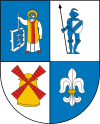Sępólno Krajeńskie
| Sępólno Krajeńskie | |||
|---|---|---|---|
|
Sępólno Town hall | |||
| |||
 Sępólno Krajeńskie | |||
| Coordinates: 53°27′0″N 17°31′48″E / 53.45000°N 17.53000°E | |||
| Country |
| ||
| Voivodeship | Kuyavian-Pomeranian | ||
| County | Sępólno | ||
| Gmina | Sępólno Krajeńskie | ||
| Government | |||
| • Mayor | Waldemar Stupałkowski | ||
| Area | |||
| • Total | 5.82 km2 (2.25 sq mi) | ||
| Population (2006) | |||
| • Total | 9,258 | ||
| • Density | 1,600/km2 (4,100/sq mi) | ||
| Time zone | CET (UTC+1) | ||
| • Summer (DST) | CEST (UTC+2) | ||
| Postal code | 89-400 | ||
| Car plates | CSE | ||
| Website | http://www.gmina-sepolno.pl | ||
Sępólno Krajeńskie pronounced ['sɛmˈpulnɔ kraˈjɛɲskʲɛ] (German: Zempelburg) is a town in Poland, in the Kuyavian-Pomeranian Voivodeship, about 63 kilometres (39 miles) northwest of Bydgoszcz. It is the capital of Sępólno County (powiat sępoleński) and has a population of 9,174 (2004).
History
The town received Magdeburg rights in 1360 from king Casimir the Great of Poland. It was located in the valley of the Sępólna River, which flooded the old castle because of its proximity to a nearby lake. The town belonged to the Ostroróg family.
During the Thirteen Years' War between Poland and the Teutonic Knights the area was captured by the Knights and the town itself looted. In the 18th century the town had an number of weavers, shoemakers and farmers. The Jews of the town traded with textiles and other fabricated goods to both West Prussia and East Prussia, for them a new synagogue was built in 1734.[1]
Partitions of Poland
The town was annexed by the Kingdom of Prussia during the First Partition of Poland in 1772. Fires in 1781 and 1782 destroyed 73 houses, so that there existed now 84 devasteted sites in the town.[1] In the year of 1783 the town had altogether 183 houses, most of them having thatched roofs.[1]
Zempelburg became part of the Duchy of Warsaw from 1807–1815 during the Napoleonic Wars, after which it was restored to Prussia. In 1871 the town became part of the Prussian-led German Empire. Zempelburg was a center for the textile and shoemaking industries.
Zempelburg belonged to Landkreis Flatow until 1920, when the eastern part of this Landkreis with the towns of Kamień Krajeński, Więcbork and Sępólno were transferred back to the Second Polish Republic after the Treaty of Versailles. The town became the seat of Sępólno County. Sępólno was annexed by Nazi Germany in 1939 and made the seat of Landkreis Zempelburg. In 1945 the town was restored to Poland.
Landmarks of Sępólno Krajeńskie include a Protestant church in the market built in 1857.
Number of inhabitants by year

| Year | Population (based in part on Prussian statistics) |
|---|---|
| 1783 | 1,628, including 651 Protestants, 390 Catholics and 581 Jews[1] |
| 1805 | 2,492, including 1,434 Christians and 1,058 Jews[2] |
| 1853 | 3,178, including 1,969 Christians and 1,218 Jews[2] |
| 1875 | 3,516[3] |
| 1880 | 3,736[3] |
| 1890 | 3,510, including 2,011 Protestants, 839 Catholics and 657 Jews (280 Poles)[3] |
| 1905 | 3,810, including 1,246 Catholics and 393 Jews[4] |
| 1910 | 3,818, including 637 Poles |
| 1920 | 3,513 |
| 1931 | 3,318 |
| 1943 | 5,207 |
| 2007 | 9,249 |
Points of interest
| Buildings and places in Sępólno Krajeńskie | ||||||||
|---|---|---|---|---|---|---|---|---|
|
Surrounding villages
- Dziechowo (Sechau)
- Grochowiec (Müllerhof)
- Iłowo (Illowo bzw. Ihlau)
- Jazdrowo (Jasdrowo bzw. Hirschhagen)
- Kawle (Friedrichsborn)
- Komierowo (Wallbusch)
- Lutowo (Großlutau)
- Lutówko (Kleinlutau)
- Niechorz (Nichors bzw. Neuhorst)
- Piaseczna (Petsnick)
- Radońsk (Waldraden)
- Sikorz (Schönhorst)
- Skarpa (Skarpi bzw. Scharfenort)
- Świdwie (Schwiede)
- Teklanowo, Trzciany (Zahn), Wałdowo (Waldau bzw. Dorfwaldau)
- Wałdówko (Waldowke bzw. Hofwaldau)
- Wilkowo (Wulfsiedel)
- Wiśniewa (Groß Wisniewke bzw. Kirschwiesen)
- Wiśniewka (Klein Wisniewke bzw. Kirschhöhe)
- Włościbórz (Großloßburg)
- Wysoka (Hohenfelde)
- Zalesie (Salesch bzw. Hüllerbruch)
- Zboże (Grünlinde)
Notable residents
- Moritz Brasch (1843-1895), philosopher
References
- 1 2 3 4 Johann Friedrich Goldbeck: Vollständige Topographie des Königreichs Preußen. Part II, Marienwerder 1789, pp. 99-100, no. 5). (in German).
- 1 2 F. W. F. Schmitt: Topographie des Flatower Kreises. In: Preußische Provinzialblätter, Andere Folge, Band VII, Königsberg 1855, S. 116.
- 1 2 3 Michael Rademacher: Deutsche Verwaltungsgeschichte - Kreis Zempelburg (2006) Source: Statistik des Deutschen Reichs. Berlin, 1883.
- ↑ Meyers Konversations-Lexikon. 6. Auflage, 20. Band, Leipzig uand Vienna 1909, p. 885.
External links
- Official town website (Polish)
Literature
- F. W. F. Schmitt: Topographie des Flatower Kreises. In: Preußische Provinzialblätter, Andere Folge, Vol. VI, Königsberg 1854, pp. 257–289 (Online) and pp. 432–461 (Online), Vol. VII, Königsberg 1855, pp. 42–46 (Online) and pp. 105–118 (Online) (in German)
- Goerke, Otto: Der Kreis Flatow. In geographischer, naturkundlicher und geschichtlicher Beziehung dargestellt. [1. Auflage: 1918] 2. Auflage, Gifhorn 1981, mit einem Nachtrag über die Zeit von 1918 bis 1945 von Manfred Vollack (902 Seiten, 113 Abbildungen und sieben Karten) (in German)
- Mathias Niendorf: Minderheiten an der Grenze - Deutsche und Polen in den Kreisen Flatow (Złotów) und Zempelburg (Sępólno Krajeński) 1900–1939 (PhD thesis, University of Kiel 1996). Harrassowitz, Wiesbaden 1997, ISBN 3-447-03917-5 (restricted preview, in German)
- Günter Bleck: Die deutsche Bevölkerung in den Herrschaften Zempelburg und Vandsburg 1750–1812. J. G. Herder-Bibliothek Siegerland, 1991 (in German).
Coordinates: 53°27′N 17°32′E / 53.450°N 17.533°E





%3B_na_Starym_Mie%C5%9Bcie%3B_cz%C4%99%C5%9B%C4%87_DK_25%2C_ul._T._Ko%C5%9Bciuszki%2C_u_do%C5%82u_cz%C4%99%C5%9B%C4%87_deptaku%2C_w_tle_Jezioro_S%C4%99pole%C5%84skie..jpg)

